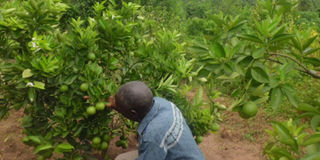Prime
Saving plant genes for food security

A farmer in Mubende checks on his oranges. Conserving crops is vital in countering the challenges that could lead to extinction of some plant species. PHOTO by Lominda Afedraru
What you need to know:
It is possible that we could lose many of the crops that provide us with food. Conserving their genes for future use is crucial.
Uganda’s agriculture sector is set to benefit from East Africa Plant Genetic Resource Network’s (EAPGREN) recently launched project to save the plant genetic resources from extinction.
Speaking at a workshop held in Mukono, Dr Fina Opio, executive director, Association for Strengthening Agricultural Research in Eastern and Central Africa (Asareca), explained the project is to address climate change’s challenge to food production.
Build on achievements
At the same time, it aims at sustainable agriculture, food security, nutrition and market linkages and trade.
“The second phase will focus on collecting genes of plant species in the countries where the project is being implemented,” said Dr Opio, adding that this five-year phase is under the theme, Capacity development for sustainable plant genetic resource utilisation and conservation in Eastern and Central Africa.
It will build on the achievements of a previous phase.
The region is home to a number of wild relatives of crops and diversities including pearl millet, finger millet, sorghum, cowpea, African rice, yam, coffee, teff, among others.
Most important
“Scientists have been searching for genes in wild relatives and traditional varieties of food crops that could help plants to adapt to variable weather conditions, resist pests and diseases, tolerate drought and produce good yields,” she noted.
This is the reason that Asareca, in collaboration with national agricultural research and extension systems in the region, are investing in conserving plant genes.
Other threats to them include degradation of the natural habitat, inadequate recognition of indigenous knowledge, desertification, deforestation, overgrazing, population pressure, urbanisation.
Dr Opio pointed out that a seed is the most important part of the agriculture value chain and has to be conserved before extinction.
She cited Serere and Bukalasa cassava varieties, which have been wiped out, as one of the reasons why farmers will benefit from the EAPGREN project.
“Our duty is to collect and conserve the crop species before have been threatened by climate change effects, invasive and alien species,” said John Wasswa Mulumba, who heads Entebbe botanical gardens and Gene Bank, explaining that the genetic variety of different crops and plant species is needed to improve the agriculture value chain.
“For every variety of crop, a lot of work has been done through quality improvement of different materials,” said Dr Mulumba, adding that the project will incorporate scientists to utilise the genetic varieties through pre-breeding at the Gene Bank.
Widen scope
Donsyious Kiambi, from African Biodiversity and Innovation Centre, said that any plant that has a natural value is considered a plant genetic resource and must be conserved.
The $8.5m (Shs22b) project is to be implemented in these Asareca countries: Burundi, DR Congo, Eritrea, Ethiopia, Kenya, Madagascar, Rwanda, Sudan, Sudan, Tanzania and Uganda. At a later stage, the scope will be expanded to cover three other countries: South Sudan, Somalia and Djibouti.




